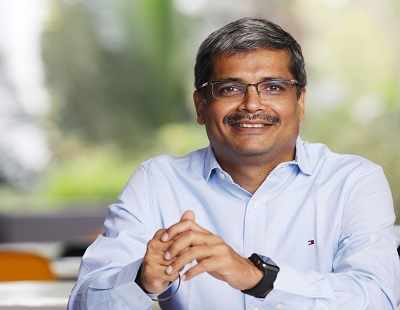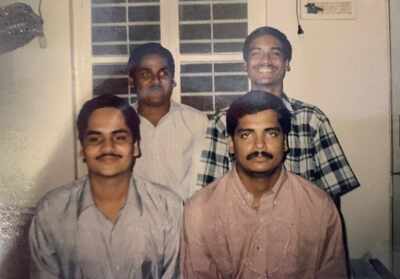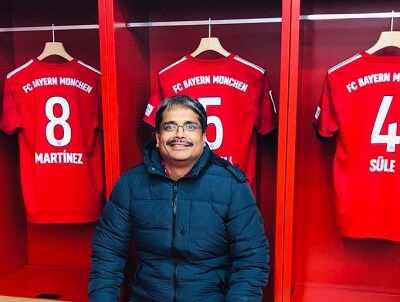
“My grandfather has a fabulous story. My grandfather was 17 when he left the small village in Rajasthan and came to Bombay. He started setting up his business of dry fruits and sweets. Till today and throughout my life, the person who has had the maximum impact on my life is my grandfather. He lived a very simple life, he was very grounded and very respectful to everyone. I learnt this from my grandfather,” Khandelwal reminisces.
Khandelwal says that his parents never forced him and his brothers to join their family business. They supported him and his brothers to do whatever they want. Even though they didn’t want the business to die but they never pressurised anyone. Today, one of Khandelwal’s brothers is CA and the other two brothers joined the family business.

It is a tradition in Rajasthani families that the elder son joins the business. Although Khandelwal was the eldest son, he and his family decided he will learn about the corporate world and will go back to business after 10-12 years. “Growing up, I had no idea what I wanted to do. When I was in 10th standard, it started becoming more and more clear. When you are in a traditional Rajasthani family, once you are out of college, you either play or go to the shop and you spend the whole time learning how the whole thing works. When I was completing my engineering, I realised, although the business was going well, the real challenge was how to scale the business. My intention was always to learn about how to scale the business within the given constraints, how to expand the business in fewer resources. My plan was to go back to business after 10-12 years.”
When Khandelwal was in college, electronics and telecommunication was a big thing and that’s why he decided to do his Engineering in Electronics and Telecommunications. When he was in college, 90% of his classmates went into IT companies and they were coding and that’s why there was a lot of pressure on him to be a coder.
He joined Grasim Industries and was placed in a very small unit in Tamil Nadu where they were setting up a new plant. Khandelwal was one of the 3 -4 people they hired in the IT department. His manager of that time – K R Krishnakumar with whom he is still in touch, divided the responsibilities and Khandelwal was given an administrative role. “I was very unhappy. Krishnakumar told me to wait for 15 days and if I still don’t like I can move on. But I started enjoying the work. One day Mr Krishnakumar said to me – You cannot grow here because there is a limitation. Why don’t you start looking out? That triggered me. I decided to leave Grasim and joined SAP. That’s how the long journey of 18-19 years at SAP started.”
When he was working with SAP, in those 18 years he worked in many different departments like development, testing, infrastructure, partner acquisitions, integration and he decided that he wants to go much broader in terms of learning and giving exposure to various things.
“When you are doing this stuff, you as a person are always thinking that I have learnt this for 3 years and now if I join again will I lose something and will you compete with a person who is younger to you? You always have this dilemma in mind. But with me, I was never really worried because I was constantly thinking about learning different aspects of the business. When you change departments, you have to start learning everything from scratch. But I have learnt that once a human is into that well, he will come out of it.”
Khandelwal had a plan that he would go back to business after 10-12 years. But he decided to stay in the corporate world instead. He says he was fortunate to be a part of such good companies. “I thought if I am going to stay in corporate, what is the closest you can get to business is the energy you get from young founders.”
About six years ago, Khandelwal’s friend who works with a venture capital firm started introducing him to a couple of startups. “I started enjoying that journey because I think the energy they bring. The risks they take which I was not able to do when I was young. I started enjoying that journey. It has become my hobby and I have met around 1500 founders in the last 5-6 years. I do this very religiously on Saturdays and Sundays. I will never lose touch with young entrepreneurs. Because I come from a family where everyone is an entrepreneur so entrepreneurship is ingrained in my blood. I am built into a system where you operate independently.”
Talking about the challenges, Khandelwal says, “I have learnt that the easiest way to solve a problem is to be transparent and honest, understand your challenges. If you start hiding it, it is going to hunt you down anyways. Try to handle your problems head-on. When you are working with a team, the team will always support you and help you come up with a creative solution. My general philosophy is when you are building your team, I feel I should hire people who are better than me at this job.”

Khandelwal says there is no substitute for hard work. You might be talented and you might have certain skill sets that others don’t but I can guarantee you that if you do hard work then you can nullify the other talented person. With the hard work you put in, you can remove your gaps. When your talent mixes with your hard work, it’s just phenomenal. “When it comes to hard work, I have a philosophy- Run it like it is your own whether you are working in corporate or startups. Take accountability, responsibility and do not run away from your problems.”



